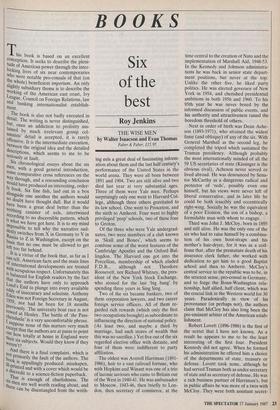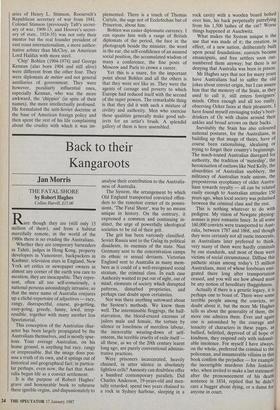BOOKS
Six of the best
Roy Jenkins
THE WISE MEN by Walter Isaacson and Evan Thomas
Faber & Faber, £15.95
This book is based on an excellent conception. It seeks to describe the pleni- tude of American power through the inter- locking lives of six near contemporaries who were notable pro-consuls of that (on the whole) beneficient imperium. An only slightly subsidiary theme is to describe the working of the American east coast, Ivy League, Council on Foreign Relations, law and banking internationalist establish- ment.
The book is also not badly executed in detail. The writing is never distinguished, but once an addiction to prolixity sus- tained by much irrelevant gossip col- umnists' detail is accepted, it is rarely offensive. It is the intermediate execution, between the original idea and the detailed descriptions, which seems to me to be seriously at fault. Six chronological essays about the six men, with a good general introduction, some comparative cross references on the way through, and a resounding conclusion would have produced an interesting, order- lY book. Six fine fish, laid out in a box alongside one another the authors would no doubt have thought dull. But it would have been a great deal better than the writhing canister of eels, intertwined according to no discernible pattern, which !S what we have got here. It is to my mind IMPossible to tell why the narrative sud- denly switches from X in Germany to Y in Russia to Z in Washington, except on the basis that no one must be allowed to get left too far behind. It is a virtue of the book that, as far as I c!rt tell, American facts and the main lines Of international developments are treated with scrupulous respect. Unfortunately this is balanced for English readers by the fact that the authors have only to approach Land's End to plunge into every available VIzly of inaccuracy and solecism. Anthony .., den was not Foreign Secretary in August, i939, nor had he been for 18 months Previously. The university boat race is not rowed at Henley. The battle of 'the Pass- chendaele' is a very uncomfortable phrase. I suppose none of this matters very much except that the authors are at pains to point eitit how totally at home in England were them six subjects. Would they know if they weren't?
And there is a final complaint, which is not Primarily the fault of the authors. The rok. is appallingly produced: misshapen, `II-printed and with a cover which would be a discredit to a science-fiction paperback. s. That is enough of churlishness. The Ix men are well worth reading about, and 'ere can be disentangled from the writh- ing eels a great deal of fascinating inform- ation about them and the last half century's performance of the United States in the world arena. They were all born between 1891 and 1904. Two are still alive and two died last year at very substantial ages. Three of them were Yale men. Perhaps surprisingly only one went to Harvard Col- lege, although three others gravitated to its law school. One went to Princeton, and the sixth to Amherst. Four went to highly privileged 'prep' schools, two of these four to Groton.
Of the three who were Yale undergrad- uates, two were members of a club known as 'Skull and Bones', which seems to combine some of the worst features of the Cambridge Apostles and the Oxford Bul- lingdon. The Harvard one got into the Porcellian, membership of which eluded F.D.R., although not Theodore Roosevelt, nor Richard Whitney, the pres- ident of the New York Stock Exchange, who atoned for the last 'big bang' by spending three years in Sing Sing. Two of the six became bankers, two of them corporation lawyers, and two career foreign service officers. All of them re- garded rich rewards (which only the first two occupations brought) as subordinate to influencing the direction of national policy. (At least two, and maybe a third by marriage, had such stores of wealth that this was no sacrifice.) Yet five out of the six regarded elective office with distaste, and four of them were indifferent to party affiliation.
The oldest was Averell Harriman (1891- 1986), heir to a vast railroad fortune, who with Hopkins and Winant was one of a trio of laconic saviours who came to Britain out of the West in 1940-41. He was ambassador to Moscow, 1943-46, then briefly to Lon- don, then secretary of commerce, at the time central to the creation of Nato and the implementation of Marshall Aid, 1948-53. In the Kennedy and Johnson administra- tions he was back in senior state depart- ment positions, but never at the top. Unlike the other five, he liked party politics. He was elected governor of New York in 1954, and cherished presidential ambitions in both 1956 and 1960. To his 95th year he was never bored by the informed discussion of public events, and his authority and attractiveness raised the boredom threshold of others.
Next in order of birth was Dean Ache- son (1893-1971), who attained the widest fame (and obloquy) of any of the six. With General Marshall as the second leg, he completed the tripod which sustained the Truman presidency. Although probably the most internationally minded of all the 59 US secretaries of state (Kissinger is the obvious rival), Acheson never served or lived abroad. He was denounced by Sena- tor McCarthy as a dangerous radical and protector of 'reds', possibly even one himself, but his views were never left of liberal conservative, and in later life he could be both irascibly and eccentrically right-wing. Socially he was the equivalent of a poor Etonion, the son of a bishop, a formidable man with whom to engage.
Third was John J. McCloy, born in 1895 and still alive. He was the only one of the six who had to raise himself by a combina- tion of his own boot-straps and his mother's hair-dryer, for it was as a coif- feuse that, after the premature death of his insurance clerk father, she worked with dedication to get him to a good Baptist school and then to Amherst. McCloy's central service to the republic was to be, in the strictest sense, pro-consul in Germany, and to forge the Bonn-Washington rela- tionship, half allied, half client, which was the crucial link in the Western world for 30 years. Paradoxically in view of his provenance (or perhaps not), the authors claim that McCloy has also long been the pre-eminent arbiter of the American estab- lishment.
Robert Lovett (1896-1986) is the first of the sextet that I have not known. As a result he appears to me to be the least interesting of the first four. President Kennedy did not agree. When he formed his administration he offered him a choice of the departments of state, treasury or defense. Lovett took none, although he had served Truman both as under secretary of state and as secretary of defense. He was a rich business partner of Harriman's, but in public affairs he was more of a twin with McCloy. They were both assistant secret- aries of Henry L. Stimson, Roosevelt's Republican secretary of war from 1941. Colonel Stimson (previously Taft's secret- ary of war, 1909-13, and Hoover's secret- ary of state, 1924-35) was not only their mentor but the real founder president of east coast internationalism, a more author- itative arbiter than McCloy, an American Lord Halifax with more steel.
`Chip' Bohlen (1904-1974) and George Kennan (also born 1904 and still alive) were different from the other four. They were diplomats de métier and not general auxiliaries of government. They were however, peculiarly influential ones, especially Kennan, who was the more awkward, the `chippief (in spite of their names), the more intellectually profound. He formulated the anti-Soviet doctrine at the base of American foreign policy and then spent the rest of his life complaining about the crudity with which it was im- plemented. There is a touch of Thomas Carlyle, the sage not of Ecclefechan but of Princeton, about him.
Bohlen was easier diplomatic currency. I can equate him with a range of British diplomats of the period, the face in the photograph beside the minister, the word in the ear, the self-confidence of an assured social position, the accumulated wisdom of many a conference, the fine posts of Moscow and Paris to crown a career.
Yet this is a snare, for the important point about Bohlen and all the others is that they were not like us. They were the agents of carnage and poverty to which Europe had reduced itself with the second of the super powers. The remarkable thing is that they did it with such a mixture of civility and authority. Men who exercise these qualities generally make good sub- jects for an artist's brush. A splendid gallery of them is here assembled.











































 Previous page
Previous page